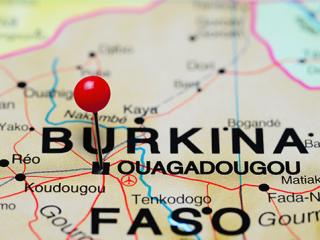
Posted by Vieux Soulama and Ksenija Maver[1]
In Burkina Faso, since 2014, gender equality and children’s rights has become an important element in the country’s policies of economic and social development, and in the budget process. This initiative is linked closely to Burkina’s recent development of program budgeting, since a focus on results offers a good opportunity for mainstreaming gender and children's rights in development programs.
Payoffs from coherent social and fiscal policies can be substantial. This is particular true in a country where only one of 100 women and only four in 100 men complete secondary school, where only 26 percent of women and 44 percent of men over 15 can write, and where over 40 percent of children are exposed to trafficking, hazardous work, and violence. Five of the six countries with the highest prevalence of child marriage in the world, including Burkina, are in West and Central Africa. In Burkina, this ratio exceeds 50 percent.
A recent study by the IMF[2] showed that per capita income growth in low-income countries of Sub-Saharan Africa could increase by as much as 0.75 percentage points if gender inequality were reduced to the levels observed in the fast-growing Asian countries. In Burkina, whose GDP per capita is about US $700, this translates to an opportunity cost of around US $90 million per year. These numbers alone call for a rapid and comprehensive response from the government.
Policy measures
An increasing number of countries around the world are introducing gender-responsive budgeting. In Africa, Morocco, Uganda and Rwanda are among the champions. Child-sensitive budgeting is relatively new compared to gender budgeting, and is being introduced in a handful of countries, including South Africa, the UK, India, and Brazil. In Burkina, a good start has also been made, with the Ministry of Economy, Finance and Development, and the Ministry for Women, National Solidarity and Family in the forefront.
Pro-gender and pro-children policies are an important element in the Sustainable Development Goals (SDGs), Burkina’s 2030 Agenda, and the National Plan for Economic and Social Development (PNDES) for 2016-2020. Their implementation in Burkina involves four key steps.
First, strengthening the existing institutional framework and promoting extensive consultations.
This framework incorporates national strategies on gender and children's rights, the focal points for gender in each line ministry and at the Court of Audit, as well as the women’s caucus at the National Assembly. It has enabled an open dialogue—involving line ministries, the Parliament, the Court of Audit, civil society, and the development partners—on pro-gender and pro-children policies.
Second, reinforcing program-based budgeting, which looks at how to deliver public services in an effective and efficient way (e.g., increasing the participation of girls in secondary education from 0.65 in 2016 to 0.80 in 2020) rather than on inputs (e.g., teachers’ salaries), and shows why social policies should focus on people and promote inclusion.
Third, launching an extensive capacity development program, which has included:
- The development of learning materials (a training manual, eleven case studies, a didactic guide for the trainers) and a fact-sheet as well as a strategy brochure to present the objectives of the strategy and raise awareness;
- Creation of a pool of 25 trainers from ten line ministries; and
- Organization of training and awareness-raising events, which covered, from early 2017 until end-April 2018, more than 550 representatives from 24 line ministries, the Court of Audit, and civil society, together with 75 parliamentarians. The participants will use these skills in presenting their budget programs, devising mechanisms for tracking performance, and discussing specific actionable targets with the development partners. Most of the training has been conducted through Burkina’s National School for Public Finance (ENAREF). A study visit to Morocco in March 2017 provided an opportunity to learn from Burkina’s peers.
Fourth, preparing technical instruments to smooth the implementation, involving:
- Clear instructions in the budget circular for 2019, with six ministries selected to pilot the initiative by formulating gender- and children’s rights-sensitive programs, actions and activities, together with quantifiable objectives and indicators, and the inclusion of these programs in the ministries’ annual performance reviews;
- Disaggregated data as well as gender and children’s rights specific indicators; and
- A new budget code to evaluate the performance and impact of gender and children’s rights programs, and use this feedback to inform future actions.
A group of development partners supported these reforms.[3]
Going forward
The framework for gender and children’s rights responsive budgeting will be rolled out gradually to the remaining ministries. Supported by extensive outreach activities, and an updated set of learning materials, it will later be extended to the local level.
The development is as much about transforming the informal institutions and mindsets as about changing rules and procedures. An open dialogue and a wide consultation process are critical, as is the development of relevant skills and competencies in public administration. Strengthening collaboration at the national and local level will be essential. As one African proverb puts it, “If you want to go quickly, go alone. If you want to go far, go together.”
[1] Vieux Soulama is General Director for the Budget at the Ministry for Economy, Finance and Development of Burkina Faso. Ksenija Maver is Project Leader of the “Strengthening Good Financial Governance in Burkina Faso” at GIZ (German International Cooperation - Deutsche Gesellschaft für Internationale Zusammenarbeit).
[2] International Monetary Fund, 2016. IMF Working Paper WP/16/111. Inequality, Gender Gaps and Economic Growth: Comparative Evidence for Sub-Saharan Africa.
[3] In particular, the UNICEF, the Swiss Agency for Development and Cooperation, USAID/National Democratic Institute, the Delegation of the European Union, a multi-donor trust fund (FCC, Le Fonds Commun Genre), Canada, the Austrian Development Agency (ADA), and GIZ
Note: The posts on the IMF PFM Blog should not be reported as representing the views of the IMF. The views expressed are those of the authors and do not necessarily represent those of the IMF or IMF policy.







